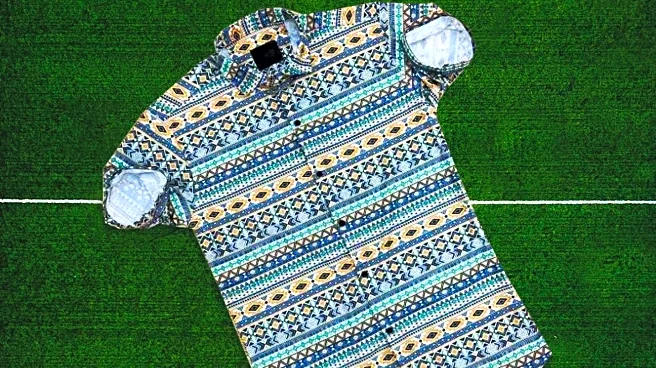What's Happening?
Football shirts have become a cultural phenomenon, transcending their traditional role as sports apparel to become symbols of personal memories and fashion statements. Since around 2018, brands and football
clubs have increasingly recognized the commercial potential of football shirts, integrating them into streetwear and fashion. This trend has seen collaborations between major sportswear brands like Adidas and Nike with fashion designers, leading to football shirts appearing on catwalks and in high-profile marketing campaigns. The World Cup is expected to further amplify this trend, with more brands seeking to capitalize on the emotional and cultural significance of football shirts.
Why It's Important?
The growing interest in football shirts reflects broader shifts in consumer culture, where sports apparel is increasingly seen as a fashion statement. This trend has implications for the sportswear industry, as brands seek to tap into new markets and demographics. However, it also raises questions about authenticity and the potential for cultural appropriation. As brands and political entities attempt to leverage the emotional connection fans have with football shirts, there is a risk of alienating the core fan base if the products lack genuine connection to the sport. This could lead to backlash from fans who feel their cultural symbols are being exploited for commercial gain.
What's Next?
As the World Cup approaches, the trend of football shirts as fashion items is likely to intensify, with more brands entering the market. This could lead to increased competition among brands to create unique and culturally resonant products. Stakeholders in the sportswear industry may need to navigate the balance between commercial interests and maintaining authenticity to avoid alienating fans. Additionally, there may be discussions within the industry about the ethical implications of using cultural symbols for profit, potentially influencing future marketing strategies and collaborations.
Beyond the Headlines
The intersection of football and fashion highlights broader cultural dynamics, including the commodification of cultural symbols and the role of sports in shaping identity. As football shirts become more mainstream, they may lose some of their traditional significance, becoming more about fashion than fandom. This shift could impact how fans engage with the sport and its cultural symbols, potentially leading to changes in how football is marketed and consumed.









